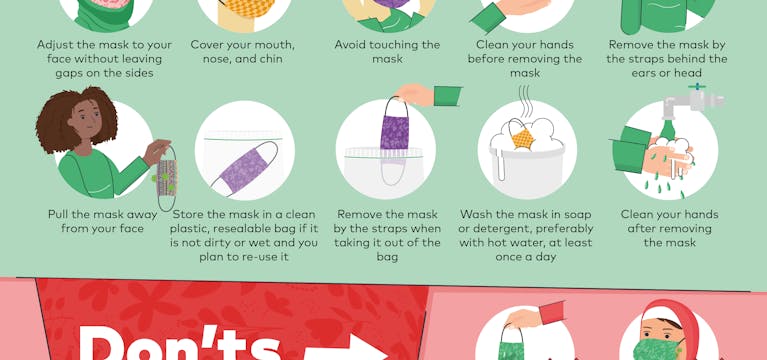Here at Play Travel, we aim to give you the most up to date information available. However, we advise anyone considering travel to follow the advice of the Australian Government and the World Health Organisation.
So, is it safe to travel during the current coronavirus pandemic? In such a rapidly changing situation, that’s unfortunately not a question we can answer for you. Thankfully, though, arming yourself with the facts will help you make an informed choice about how to keep yourself, and the people around you, safe.
What we can say definitively is, the face of travel has changed. Current, and post-COVID, travel precautions will have a much stronger focus on disease prevention. So, let’s all be informed, proactive and get used to wearing masks on flights and in public places.
What we know about Coronavirus (COVID-19)
What we know about COVID-19 is growing by the day - but put simply, it’s an infectious disease caused by a newly discovered coronavirus.
The COVID-19 virus spreads primarily through droplets of saliva or discharge from the nose when an infected person coughs or sneezes and it’s highly contagious. Still, there are lots of things you can do to keep yourself and those around you safe but more about that later.
Rapid research and ongoing clinical trials have fast-tracked vaccines for COVID-19 which are currently rolling out in various countries around the world. As you're probably aware, Australia has started administering the vaccine this year, with state travel restrictions set to change as soon as we've reached a vaccination threshold (70% of the population is vaccinated).
The good news is, ordinary soap and water, or hand sanitisers are effective in killing the COVID-19 virus. So as long as we consistently take some simple precautions, we have a pretty good chance of staying well.
COVID-19 travel hygiene checklist
The best way to prevent and slow down the transmission of COVID-19 is to be well informed about the virus and how it spreads. As well as following state and federal Government restrictions.
Taking preventative measures to travel safely and avoid catching Coronavirus (COVID-19) is essential, but that’s only half of it. Because many people who test positive for Coronavirus (COVID-19) are asymptomatic, it’s also crucial for us to act like we have it and take the relevant precautions as if we were infected.
So basically, we need to behave as though we are infected with the virus, while also trying to avoid catching it. So how do we do this?
1. Wash your hands
It’s simple, and it’s the most important thing we can do.
Wash your hands with soap and water, or an alcohol-based sanitiser rub, after touching any surface (including yourself) and always carry hand sanitiser with you when travelling.
2. Avoid touching your face
The average person touches their face 23 times per hour, and when you’re trying to avoid it, the urge doubles. But the WHO specifically lists face-touching as one of the leading causes of infection, so try your hardest not to do it.
3. Practice respiratory etiquette
COVID-19 spreads mainly through respiratory droplets, produced when an infected person coughs, sneezes or talks. This is the reason respiratory etiquette is so paramount right now.
Some ways to practice proper respiratory etiquette include:
- Cough into a flexed elbow.
- Keep physical distance (1.5m) between yourself and others.
- Wash your hands or use sanitiser after touching your face or nose.
- Stay isolated if you have any signs of respiratory illness.
4. Wear a mask in situations where social distancing isn't an option
Unless you work in a hospital, mask-wearing isn’t something many Australians are familiar with, but it’s becoming more and more part of everyday life. And, for those of us who still want to travel, even if it’s only in our own backyard, we’re going to have to get used to it. So, we’ve broken down the do’s and don'ts of mask wearing to make it easier for you.
Masks - what you need to know
You may see a lot of people around wearing fabric masks. These are intended for source-control, which means they prevent the mask wearer from spreading the virus.
Here are a few things you need to take into consideration while wearing a mask
If you choose to use a fabric mask, it should have three layers.
- The first should be a cotton or absorbent layer.
- The middle should be a filter layer, preferably replaceable.
- The outer layer should be a tightly woven material that repels droplets.
It’s still unknown how much fabric masks protect the wearer, but we do know they protect others. Most airlines and airports are currently recommending people wear masks while flying - and only some are accepting fabric masks.
The World Health Organisation recommends people who are over 60 or medically vulnerable, use medical masks, not fabric ones.
How to keep your fabric mask clean:
- Before touching your mask, wash or sanitise your hands.
- Avoid touching your mask while you’re wearing it.
- Make sure your chin, mouth and nose are completely covered.
- Wash your mask once a day in hot, soapy water.
- Store your mask in a Ziplock bag.
If it’s difficult for you or any of your family to wear a mask due to having specific sensory needs, there are lots of options available, so do some research to find one that works for you.

Do I need to wear a mask while flying?
Yes. We’re getting asked this a lot right now as it has a big impact on how we’re all used to travelling. However, it’s the safest thing to do. Obviously, it’s quite hard to physically distance on a plane, so covering your nose and mouth with a mask is the most responsible way to travel.
Each airline has its own requirements though, so check with them before flying. You’ll also need to check whether the airports you’re moving through require you to wear a mask too.
Likewise, many countries have now moved toward mandating mask use for residents and visitors. And, given COVID-19 has spread to pretty much every country, even those identified as the safest countries in the world, it’s a good idea to check ahead.
Other tips for keeping safe while travelling during COVID-19
If you do decide to travel (and you're able to within Government restrictions), there are some extra precautions you can take while you’re on the road. These may seem minor, but they’ll help keep you, and your loved ones, safe and make for a more enjoyable trip.
- Make sure there is a system in place to track who has been at any venues you’re visiting:
I'm sure you've heard of QR codes a lot recently. It's time to use them.
Most restaurants, bars, gyms and other venues are asking people to register their details via a QR code so they can be contacted easily if a COVID-19 case is identified at their establishment. In some states, this is now mandatory. It’s a good idea to check in at each venue you plan to visit is collecting this info and reconsider visiting anywhere that doesn’t have this process in place.
NOTE: While some venues allow you to register on your phone after scanning a QR code, others are using a paper sign-in form. It’s a good idea to carry a pen for the latter so you don’t need to touch a shared one.
2. Look for easily accessible sanitiser:
Access to a sanitiser, preferably in a hands-free dispenser, is a necessity. If the restaurant, store or airport you’re in does not have it available, there’s a good chance many people in that space haven’t used it. Proceed with caution.
3. Check if the staff are taking suitable precautions:
If you can’t see staff members taking necessary precautions, there’s a good chance they aren’t. Most of the recommended precautions for preventing the spread of COVID-19 are visible ones - think hand sanitiser stations, touchpoint cleaning, mask-wearing and effective sanitary cash handling. If you don’t see these things happening, perhaps move along to the next location.
Will we need to keep up these travel precautions post-COVID-19?
Honestly, no one knows what travel precautions post-COVID-19 will look like. The travel industry may be forever changed, and in some ways for the better. Travellers will need more flexibility and, as countries open up to tourism again, those in the industry will need to follow suit. Flexible date change policies and payment plans, like paying for your holiday in instalments, are likely to need to become the norm.
There’s also a good chance some of the current travel precautions, such as wearing masks while flying, and in airports, will become commonplace. If that’s the path to getting back to the holidays we all know and love, we don’t think it’s such a high price to pay.
For now, though, let’s all become familiar with hygiene etiquette and take the necessary precautions. Because the quicker we kick this, the quicker we can get back out there to see the world!
Be patient and flexible
There’s never been a better time to show your appreciation for people in the service and tourism industries. Get out there when you can and go see as much of your own backyard, and the world, as possible.
When you do? We recommend you prepare for COVID-19-related inconveniences. Some airports and tourism venues may have policies you may find contradictory - and you’ll just need to go with it. That may even be the case with package or all-inclusive holidays when the normally seamless integration of multiple providers feels a bit clunky.
Unless there is a legitimate danger to you or your party, avoid complaining. Be patient, be kind and be part of the solution! This is the first time any of us are dealing with a situation like this, so there are always going to be hiccups along the way.
You’ll have a better trip if you have a flexible mindset, practice good hygiene etiquette and stay vigilant.
Happy travels!






